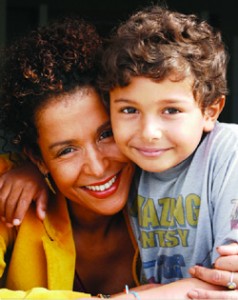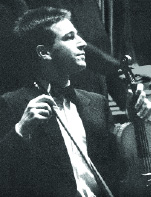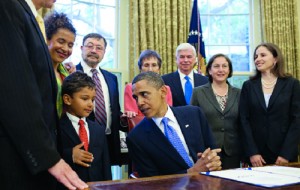Arts
Feature
A Legacy in Harmony

It has been 10 years since Daniel Pearl was kidnapped and murdered by Islamic extremists in Pakistan. He would have celebrated his 49th birthday on October 10. This milestone will only intensify his family’s thoughts on the husband, father, son and brother they lost so brutally in 2002.
“Some of the pain has been suppressed and buried and, at least on the surface, we do well,” Judea Pearl said. “It’s only when I go back 10 years and read the old e-mails that my bitterness returns. How can anyone harm such a beautiful person, who managed to befriend anyone he met? As human beings, we don’t have the software, the computational machinery, to comprehend this.”
From his present perspective, Pearl feels that “history has imposed a mission on us” to do what we can to fight against the politics of hate and the terrorists’ ideology that elevates perceived grievances above the norms of civilized society. “In one sense we are fortunate,” he noted. “A lot of men and women come up to me who have lost a son in war or in traffic accidents, leaving behind few marks except on their immediate families.” By contrast, in his son’s case, “there have been outside reverberations, which have given us at least the illusion that we can fight back against the ideology of hate.”
In letters, e-mails and personal contacts, many people have shown that they see the Pearl family members as examples of human resilience, with the ability to create something positive out of their loss.
Daniel’s sister Michelle, 42, a Ph.D. in public health and mother of two, vividly recalled the month-long agony after her brother was kidnapped, when there was still hope that he would be released unharmed.
“We were all waiting for news from the State Department, from the F.B.I., from anyone—it was a crazy situation,” she said. “I was answering the phone because we didn’t want my parents’ accents to give away their Israeli background.” Now, a decade later, people who recognize the Pearl name still come up to Michelle to talk about her brother, but “I have little to say,” she explained. “You cannot relive the past all the time.
“My mother [Ruth] was the captain and she ran a tight ship [after the tragedy],” Michelle said. It was Ruth who shepherded the family into the practical decisions that faced them when the flow of sympathy donations arrived in small checks from all over the world; priority was given to establishing a trust fund for Mariane Pearl and her yet unborn child.

Given that Daniel Pearl was an accomplished violinist, equally at home in classical, jazz, country and bluegrass, it is unsurprising that the Daniel Pearl World Music Day was one of the foundation’s first initiatives. Judea Pearl, a computer science professor at the University of California in Los Angeles and one of the world’s leading experts on artificial intelligence, is a guitar player, keyboardist, singer and choral conductor who, for 10 years, led the Hebrew choir LA Shir.
By 2011, participation in the Daniel Pearl World Music Day had risen to 2,088 musical performances in 83 countries—including Iran, Saudi Arabia and Russia—and Judea Pearl expects at least that many this year. Since 2002, there have been more than 8,900 concerts in 119 countries; participating artists have included Sir Elton John, Yitzhak Perlman, Herbie Hancock, Ravi Shankar, Salman Ahmad, Yefim Bronfman, R.E.M. and annual participant conductor Zubin Mehta with the Israel Philharmonic Orchestra.
This year, dedicated performances will span the globe from Canada to Ghana and from Australia to Belgium as well as Jerusalem. Among them will be the Hardly Strictly Bluegrass Festival held in San Francisco, California—with 6,000 schoolchildren bused in—and Daniel Pearl’s alma mater, Stanford University. The diversity of musical styles includes classical, rock, pop, hip-hop, jazz, reggae, Afro-Cuban and more.
Throughout the month of October, musicians in close to 90 countries are expected to mark Daniel Pearl World Music Day with more than 2,000 musical performances on the theme Harmony for Humanity.
The day’s heart-wrenching remembrances celebrate “a gentle soul…the musician, the writer, the storyteller, the bridge builder,” as Judea and Ruth Pearl have described their son.
Joyous music reflects one of the many ways in which Pearl’s family has harnessed the visibility of the tragedy into public good. The Pearls established the Daniel Pearl Foundation to perpetuate their son’s striving and hopes for world understanding through journalism, musicianship and dialogue. Today, with violence and hatred still inflaming parts of the world, the foundation’s raison d’être is as relevant as ever. (Judea is president, Ruth is chief financial officer and sisters Michelle and Tamara are vice presidents of the foundation.)

Daniel Pearl’s widow, Mariane, and their son, Adam Daniel, live in Barcelona, Spain, where she pursues her journalism career writing about women’s struggles for world peace.
Her husband was, foremost, a reporter, stationed in 2002 in Karachi, Pakistan, as South Asia bureau chief for The Wall Street Journal. Fittingly, the foundation established a Daniel Pearl journalism fellowship in partnership with the Alfred Friendly Press Fellowships. It brings midcareer journalists from South Asia, the Middle East and North Africa to work for six months in newsrooms of such newspapers as The New York Times, The Wall Street Journal and Los Angeles Times, then a week at The Jewish Journal of Greater Los Angeles.
One of the foundation projects that Michelle and Tamara developed is the Daniel Pearl Media Internship, which awards two-month newspaper, radio and television internships to 16- to 23-year-old Israeli and Palestinian youth who have participated in a coexistence and dialogue program.
Another journalistic endeavor is a magnet high school bearing Pearl’s name in Van Nuys, California, specializing in journalism and communications.
In 2008, one of the Times fellows in the journalism fellowship program was Umar Cheema of The News International in Islamabad, Pakistan. After his fellowship, Cheema started writing about the endemic corruption in the Pakistani government and society. He was abducted in Islamabad in September 2010 by a group of assailants (allegedly military intelligence) who stripped, shaved and photographed Cheema in humiliating positions. He was released six hours later. In an article he wrote in April 2012 for the International Press Institute, the award-winning Cheema explained that “it was not [only] an attack on my person but also on freedom of the press.”
Until then, it was the norm for assaulted Pakistani reporters to stay silent. (In 2011, the country had the largest number of journalists killed.) Cheema, however, broke the unwritten rule by filing a police complaint and his example emboldened five other Pakistani newsmen to follow suit. As a result, antipress violence was openly discussed in the country for the first time. “Cheema is a brave man, but he also knew that, for the first time, he would have the backing of the U.S. State Department, thanks to the Daniel Pearl Freedom of the Press Act,” Judea Pearl asserted.
The bipartisan bill, signed into law by President Obama in May 2010, four months before Cheema’s ordeal, instructed the State Department to follow and report “with vigor” violations of press freedom anywhere in the world.
The White House signing ceremony was attended by the Pearl family, including Mariane and the 7-year-old Adam, born three months after his father’s murder, who came away with a yo-yo imprinted with the presidential seal, a packet of M&M’s and a memorial coin.
Since its inception, the fellowship program has hosted 16 editors and reporters, predominantly from countries with Muslim majorities. “If we in the West are serious about reaching the hearts and minds of the Muslim masses, obviously a homegrown journalist is immensely more credible and can reach many more people than foreign media,” said Ruth Pearl, an electrical engineer, computer consultant and instructor and National Public Radio commentator.
Among other prestigious foundation programs are the annual Daniel Pearl Memorial Lectures, hosted annually by UCLA and Stanford University, which have featured Thomas L. Friedman, Daniel Schorr, Ted Koppel, Anderson Cooper, Christiane Amanpour, The New Yorker editor David Remnick and the late Christopher Hitchens.
As the roster of speakers shows, Pearl’s death affected his journalistic colleagues deeply, and the tragedy has been remembered in books, feature films and documentaries. Mariane Pearl wrote the book A Mighty Heart: The Brave Life and Death of My Husband, Danny Pearl (Scribner), which was made into a movie of the same title in 2007, starring Angelina Jolie as Mariane Pearl.
The Daniel Pearl Dialogue for Muslim-Jewish Understanding is an idea that is rooted in Daniel Pearl’s constant effort to explain the Muslim perspective to his Western readers—as well as Judea Pearl’s willingness to discuss any topic with any challenger.
Starting in 2003, Judea Pearl and Akbar S. Ahmed, Ibn Khaldun Chair of Islamic Studies at American University in Washington, D.C., one of the world’s leading scholars on Islam, linked up for a series of discussions as part of the dialogue event, speaking before American and international multifaith audiences.
Pearl has also led public discussions at more than 40 community centers in the United States and the United Kingdom on such topics as “Carving a Path for Jewish-Muslim Dialogue” and “Being Western, American and Jewish in the Post-9/11 World.”
Astonishingly, while striving to give meaning to his son’s death, Pearl, 75, has simultaneously been showered with international academic honors for his path-breaking innovations in artificial intelligence—the discipline probing the partnership between humans and robotic machines. In June 2012, he received the prestigious Turing Award from the Association for Computing Machinery, described as the Nobel Prize in computing. Three months earlier he was awarded the Harvey Prize in Science and Technology from his alma mater, the Technion–Israel Institute of Technology in Haifa.
Despite his career achievements and his work for the foundation, Pearl never loses sight of his family’s history and its connection to the history of the Jewish people.
In an appearance before a United Nations panel in January 2006, he movingly declared: “As I stand before you, I represent three generations scarred by hate-based murders. My grandparents perished in a genocide that was; I narrowly escaped a genocide that was meant to be [in 1948]; and Danny, my son, fell victim to the murderous terrorism the world faces today.”
A Father’s Voice
The tragedy of Daniel Pearl’s murder has transformed everyone in his family, none more than Judea Pearl. He has become a forceful public speaker, skilled debater and persuasive writer of opinion columns for The Wall Street Journal, Los Angeles Times and The Jewish Journal of Greater Los Angeles.
He has used his high visibility not only to promote the goals of the Daniel Pearl Foundation but for the cause of Israel on college campuses in particular and across the nation. As a well-known professor and secular Jew in a politically liberal university and state, Pearl has what he believes many Zionist and Israeli spokespersons lack—a liberal, leftist vocabulary. “Many Jewish liberals are confused about Israel, while staunchly conservative advocates don’t appeal to the majority of American Jews,” Pearl said.
He frequently addresses Muslim and pro-Palestinian groups and invites them to ask their toughest questions, provided they are expressed civilly.
“My basic credo is that Jews and Arabs are equally legitimate and indigenous inhabitants of the land and that the State of Israel must be accepted as an equal member of the Middle East family,” Pearl said. —T.T.










 Facebook
Facebook Instagram
Instagram Twitter
Twitter
Leave a Reply